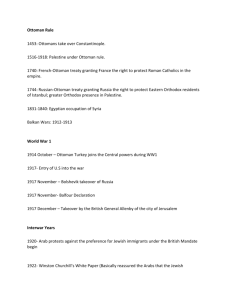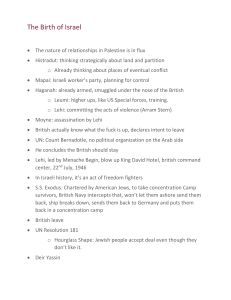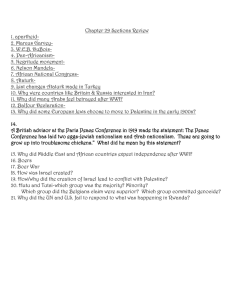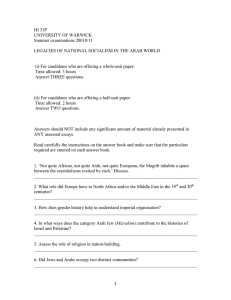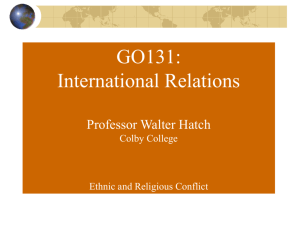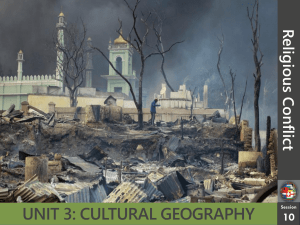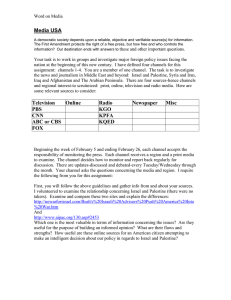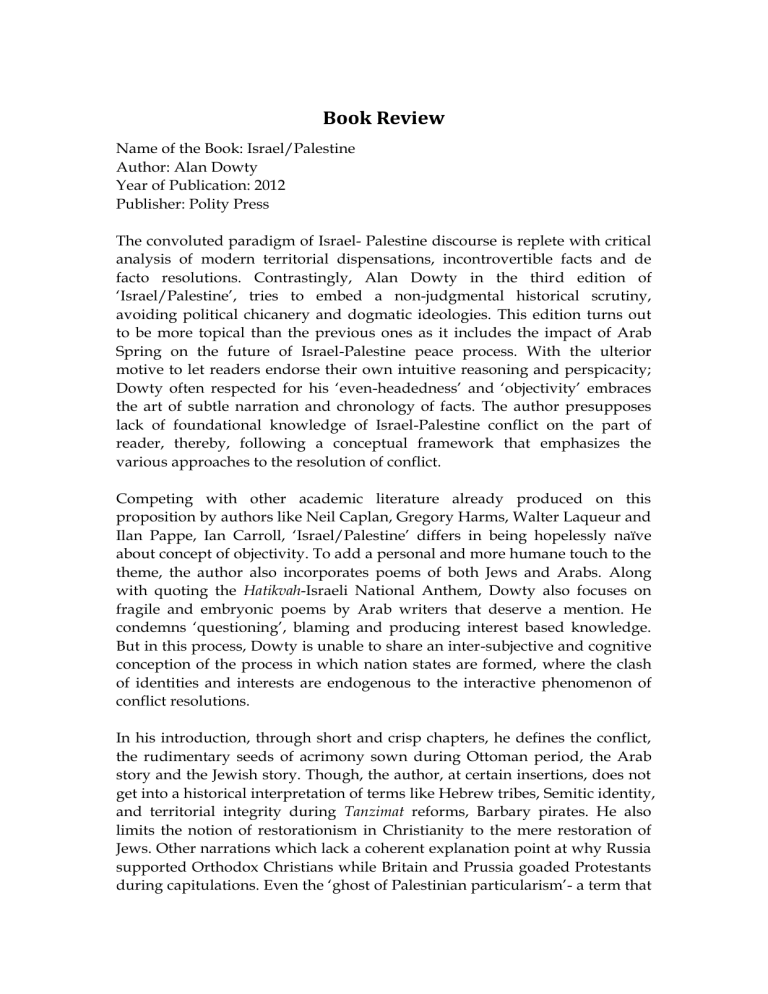
Book Review Name of the Book: Israel/Palestine Author: Alan Dowty Year of Publication: 2012 Publisher: Polity Press The convoluted paradigm of Israel- Palestine discourse is replete with critical analysis of modern territorial dispensations, incontrovertible facts and de facto resolutions. Contrastingly, Alan Dowty in the third edition of ‘Israel/Palestine’, tries to embed a non-judgmental historical scrutiny, avoiding political chicanery and dogmatic ideologies. This edition turns out to be more topical than the previous ones as it includes the impact of Arab Spring on the future of Israel-Palestine peace process. With the ulterior motive to let readers endorse their own intuitive reasoning and perspicacity; Dowty often respected for his ‘even-headedness’ and ‘objectivity’ embraces the art of subtle narration and chronology of facts. The author presupposes lack of foundational knowledge of Israel-Palestine conflict on the part of reader, thereby, following a conceptual framework that emphasizes the various approaches to the resolution of conflict. Competing with other academic literature already produced on this proposition by authors like Neil Caplan, Gregory Harms, Walter Laqueur and Ilan Pappe, Ian Carroll, ‘Israel/Palestine’ differs in being hopelessly naïve about concept of objectivity. To add a personal and more humane touch to the theme, the author also incorporates poems of both Jews and Arabs. Along with quoting the Hatikvah-Israeli National Anthem, Dowty also focuses on fragile and embryonic poems by Arab writers that deserve a mention. He condemns ‘questioning’, blaming and producing interest based knowledge. But in this process, Dowty is unable to share an inter-subjective and cognitive conception of the process in which nation states are formed, where the clash of identities and interests are endogenous to the interactive phenomenon of conflict resolutions. In his introduction, through short and crisp chapters, he defines the conflict, the rudimentary seeds of acrimony sown during Ottoman period, the Arab story and the Jewish story. Though, the author, at certain insertions, does not get into a historical interpretation of terms like Hebrew tribes, Semitic identity, and territorial integrity during Tanzimat reforms, Barbary pirates. He also limits the notion of restorationism in Christianity to the mere restoration of Jews. Other narrations which lack a coherent explanation point at why Russia supported Orthodox Christians while Britain and Prussia goaded Protestants during capitulations. Even the ‘ghost of Palestinian particularism’- a term that demands a very subjective and in-depth explanation is dealt in a very daft manner. Th neo-liberal institutionalism and complex interdependence that functions in the unifying the AIPAC lobby with US, thereby influencing the existence of Israel is not dealt with in great detail. Even little insights like the role of Eddie Jacobson’s in convincing US President Truman in recognizing Israel, just as it did declare its independence, is not dealt with. Such insights which are revealed in other books like ‘O Jerusalem’ of Dominique Lapierre and Larry Collins or ‘Reset’ of Stephen Kinser; make it even more interesting for the audience to connect with the narrative. Very often, it seems like the fusion of innumerable facts makes the analysis quite flawless in technicality of events but weak in arousing debates, hence the implications become quite anachronistic. For example, the fragile discussion on the advent of Arab Spring for the future of Israel-Palestine debate, demands much more than underpinnings over revolutions and desolate monarchies. Few predictions that Dowty made with Muslim Brotherhood gaining foothold over Egypt after the downfall of Mubarak did not excel in the test of time. Interestingly, even though he makes such critical observations, Dowty fails to analyze the ramifications of the abrogation of 1979 peace treaty of Egypt and Israel. Also, when he states that a mutually decided way-out is still possible with Hamas winning an election and Israeli politics moving to the right but the entire book does not go into the in-depth hotspot of tension- Jerusalem, while dealing with the answers to this rhetoric. Even the fractions which are developing between Obama’s foreign policy and Netanyahu’s response to it have been avoided. Delving into these struggling caveats is essential because it is more than just geo-politics but also suggesting the weakening of US’s role in West Asia. The lacunas become more visible during the chronicle of Arab story that is monotonous, brimming with already known facts. The man-slaughter at Deir Yasin is not discussed with great precision, thereby limiting its significance in causing Al Nakba. Though, Benny Morris’s opinions are added in a helter-skelter manner, other more radical interpretations of Rashid Khalidi, Ilan Pappe, Noam Chomsky are avoided. Dowty does not explain the Arab Israeli wars in great detail and depth, especially the 1967 war and its reverberations in both Israeli and Palestinian politics. The role of AIPAC, military industrial complex, embedded liberalism and two-level game analysis are not mentioned while discussing the peace process. The mere ‘authoritative’ summing of facts, often weakens the lucidity of the text and renders it dry. As we approach the end, ever shorter narratives on practical solutions and reflections gives an impression of an impatient endeavor. ‘Israel-Palestine’, rich in factual information but very weak in theoretical and analytical understanding can hence, be fruitful only for readers that have a very nascent understanding of the conflict. The deconstruction of the Israel/Palestine debate lacks substance while dealing with ‘multiple identities’, structural transformations in the bi-polar world and process of institutionalization of United Nations. Thus, the narrative does not explain the analytical reason for why great powers, behave differently with different states, e.g.-United States and USSR in the case of Arab-Israel conflict. It makes it difficult to challenge the dichotomous privileging of international structure dealing with the establishment of new states over the process of it. The ‘transformed identities’ of both Jews and Arabs is not discussed at all. Especially about the Arabs who chose to stay in Israel and have now become citizens. Nevertheless, the objectivity of the book makes it quite herculean to criticize it. In a nutshell, the hypothesis of Alan Dowty to reduce the confrontation to its very core, in order to demystify it and shed illusions is an impressive understanding, a fact that can be witnessed with his equitable anecdote.
